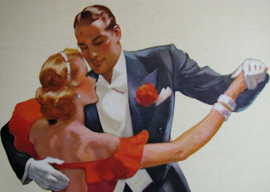
October 01, 2016

Although my birthday was in August, I chose the rather autumnal melancholy moment of September to celebrate it—mourn it, rather. There are no ifs or buts about it, turning 80 is like that final beautiful gleam of light just before you lose consciousness during a boxing bout. The beauty of adolescence is that one doesn’t know why one’s angry or unhappy. The tragedy of old age is that one does know.
I was a lucky young man. I was often angry but hardly ever unhappy. That is why The Catcher in the Rye was my favorite book, along with Tender Is the Night and The Sun Also Rises. Holden saw through human beings—hardly an adolescent trait—and he was unforgiving about phonies. I never met a phony whose spiel I didn’t fall for until too late, hence my admiration for Holden. One thinks of nostalgia as an emotion that grows with age, but in reality nostalgia is strongest when one’s young. (Revisiting one’s school two years after graduation and noticing for the first time how small the desks are; or looking at the post office where one stood heartbroken waiting for her letter.)
But hang on, this is supposed to be about old age, not adolescence, so Holden Caulfield has to take a backseat for a while. Many writers call it a day at 80, but that’s because they’ve written something of value. The poor little Greek boy has not, so I’ll keep going until I do. Which brings me to Papa Hemingway. Here he is in A Moveable Feast: “When spring came, even the false spring, there were no problems except where to be happiest. The only thing that could spoil a day was people…. People were always the limiters of happiness except for the very few that were as good as spring itself.” I read that phrase, and many others while in my 20s, and as they say in America, they blew my mind. I had to write and be like Papa. Here was a man who traveled the globe, wrote about whatever captured his fancy, pursued women in the fleshpots of the Western world, covered wars on the front line, and had a ten-page obituary in Time magazine after he had blown his brains out. “After writing a story I was always empty and both sad and happy, as though I had made love,” he wrote. How true, how true, and how unfulfilled the present crop must be after the crap they write.
Papa killed himself because he could no longer write. He was 19 years younger than yours truly when he pulled the trigger of the double-barreled shotgun. Old age does make the words flow like cement, and where once upon a time I used to knock off a column in forty minutes flat, it now takes close to three hours because the words are not there and have to be extracted like teeth from one’s subconscious. “All stories end in death,” wrote Hemingway, and in a way all do.
Here’s one of the first pieces I produced for The Spectator:
No sane person goes into the lavatory of Studio 54 without a surgical mask as if in an asbestos plant during an explosion. Masses of humanity sniff, snort, sneeze, cough and expectorate. The owner is seriously thinking of taking out the toilet bowls as redundant.
Could I write this today? Of course I could, but I don’t feel like it. That’s old age for you. At 80 I no longer think something I write or say will have any influence on what happens, but still I go on. And I even threw a party to celebrate the disaster.
I gave it at 5 Hertford Street, Robin Birley’s jewel of a nightspot in Mayfair. I had 101 guests, including Nando, the great doorman of the old Annabel’s, who is close to 90. I had specified in the invitation that there would be no presents or speeches. Wafic Said and many others ignored my request. Wafic’s gift I will mention because it is so original and imaginative. It is a portrait of me reading The Spectator by the very good artist Dick Smyly, with pictures of my wife, my children, karate fights, and various boats in the background. It will be handed down, so the family will not totally forget the Greek boy.
The party’s high point was Nicky Haslam’s rendition of “You’re the Top” with words as good as Cole’s, and that’s saying something:
When just a pup, you were quite a slayer
In the Davis Cup…a demon circuit player
And it was on the courts you saw white lines that might
Go straight up your nose, keep you on your toes, and up all night
And in Gay Paree, or any city you were bored,
You’d call Odile or Zsa-Zsa, Joan Collins or Ava…
Or Madame Claude
You’re the top, you’re the sum of glamour
And you were, even in the slammer
And your yacht, HMS Bushido
Does a lot, for your male libido
You’re the fare at a Pugs Club dinner
You’re as rare, as a Claremont winner
At the end, when you meet your maker,
You’ll see your friends, all those sweet dictators,
As you kneel to pray, the Lord will say…
I’ve quoted just a few lines, and badly, I’m afraid, but what I’d like to know is why hasn’t a newspaper hired Nicky to write a regular column about the high, witty life of London? If you’d heard the whole song, you would, immediately. And what perfect timing. Thank you, Nicky.